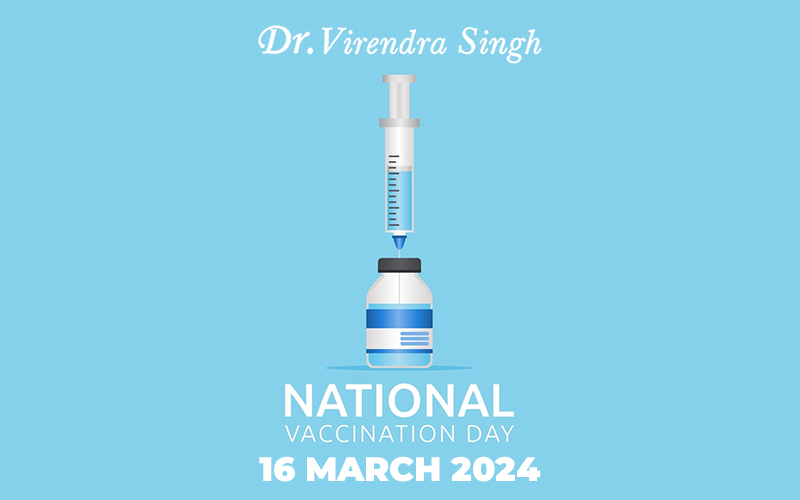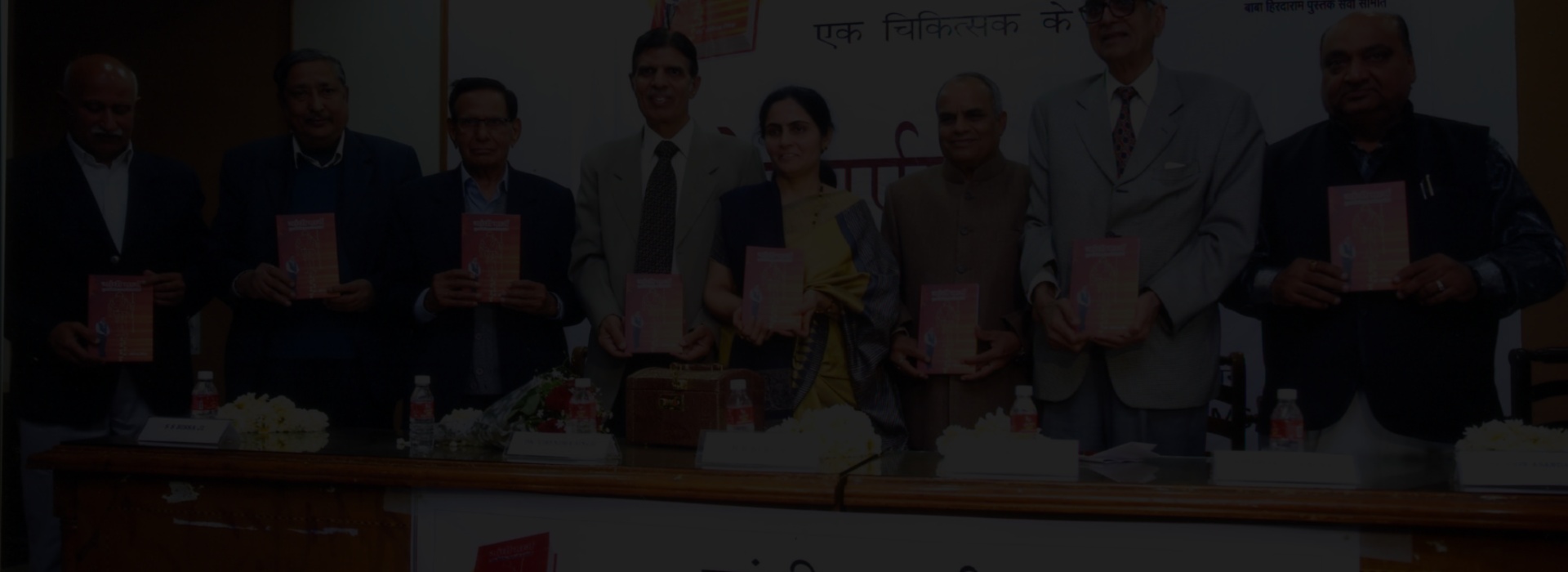
National Vaccination Day is observed annually on March 16 to raise awareness of the value of vaccination. The administration of the first oral polio vaccine in 1995 was a historic event in India’s history. Vaccination is a powerful way to prevent serious diseases and is supported by the World Health Organization (WHO). This day serves as a reminder of how vaccinations improve public health, lengthen life expectancy, and benefit our society. Each year on March 16, the National Vaccination Day, officially known as National Immunization Day, is commemorated to emphasize the significance of vaccination to the whole country.
National Vaccination Day 2024 is an important date in the history of continuous international campaigns to protect public health and fight infectious illnesses. This annual observance underscores the importance of vaccination in preventing the spread of contagious illnesses and promoting overall well-being. When India started its Pulse Polio Campaign in 1995, that was the year the day was first observed. This year’s National Immunization Day is especially important because the government successfully stopped the spread of the deadly COVID-19 virus by launching the biggest immunization campaign earlier in the year.
The advocacy of Dr. Virendra Singh on this day acts as a trigger to encourage communities to accept vaccination as a shared obligation. Through his tireless efforts, he reinforces the importance of a vaccinated populace in building resilient societies capable of withstanding health challenges. National Vaccination Day, under Dr. Virendra Singh guidance, becomes a momentous occasion to rally public support, foster awareness, and collectively contribute to the global pursuit of public health excellence.
The Theme of National Vaccination Day
The main theme for India’s National Vaccination Day on March 16, 2024, is “Vaccines Work for Everyone.” The theme argues that all human lives, regardless of age, gender, location, or socioeconomic level, must be protected from avoidable diseases by safe and effective immunization.
National Vaccination Day Timeline
- 1796 (First Successful Vaccination): Edward Jenner was able to effectively illustrate how to vaccinate against smallpox using cowpox.
- 1885 (Rabies Vaccine Development): The first effective vaccination against rabies was created by Louis Pasteur.
- 1955 (Polio Vaccine Invented): Jonas Salk developed the first effective vaccine for Polio.
- 1974 (Expansion of Immunization Program): The Expanded Program on Immunization was started by the World Health Organization (WHO) to guarantee that all children have access to regularly advised immunizations.
- 1995 (Hepatitis A Vaccine Approved): The first Hepatitis A vaccination in US history was authorized by the Food and Drug Administration (FDA).
- 2020 (COVID-19 Vaccine Development): During the worldwide epidemic, many COVID-19 vaccinations were created and quickly put into circulation.
Significance of National Vaccination Day
- Saving Lives: This Day is all about celebrating the fact that vaccines save lives. They are necessary for a healthy life and have a significant positive social and economic impact on our communities.
- Amazing Human Achievements: The development of vaccinations is regarded as one of the greatest achievements in human history. On National Vaccination Day, we celebrate the advancements in medical research that have significantly improved our health.
History of National Vaccination Day
- From Ancient Times to Today
Evidence suggests that the Chinese were utilizing a form of vaccination as early as 1000 A.D., indicating that vaccination has a lengthy history. Later, before it reached Europe and the Americas, it spread to other cultures. In 1796, Edward Jenner played a crucial role by successfully using a vaccine to protect against smallpox. This laid the groundwork for more vaccines, and by 1979, mass vaccination efforts had eradicated smallpox.
During the 18th and 19th centuries, researchers such as Louis Pasteur created vaccinations against Anthrax and Cholera, as well as the invention of the plague vaccine. Bacterial vaccines, such as the BCG vaccine that is still in use today, were created between 1890 and 1950. In the early 20th century, vaccines for Tetanus and Diphtheria were created. Later, in the middle of the 20th century, massive vaccination campaigns combined with the invention of the Salk and Sabin polio vaccines nearly resulted in the global eradication of polio.
- Recent Advances
There have been notable developments in the field of vaccination throughout the past 20 years. We now have effective vaccinations against seasonal influenza and hepatitis B. Future vaccinations against allergies, autoimmune illnesses, and addictions should be much more advanced due to technological advancements.
Why National Vaccination Day is Important
- Vaccinations Save Lives: Raising awareness of the value of immunizations in preventing fatal diseases is the primary objective of National Vaccination Day. You are protecting not just yourself but also people in your vicinity who might not be able to get vaccinated by getting immunized.
- It Strengthens Public Health: We can stop major disease outbreaks and strengthen communities by improving public health by supporting and encouraging immunization. Vaccines have been proven to drastically reduce the spread of disease and improve overall health outcomes.
- It’s a Global Effort: National Vaccination Day is important not just locally, but on a global scale. We can work toward the global eradication of dangerous illnesses by increasing awareness and guaranteeing that everyone, regardless of their nation or economic condition, has access to immunizations.
5 Miraculous Facts for National Vaccination Day
- Vaccines Have Curbed Child Mortality Rates Globally: UNICEF estimates that vaccinations presently save two to three million lives annually. They have significantly reduced child mortality rates worldwide, especially from diseases like Polio and Measles.
- Vaccines Eradicated Smallpox: The first and only illness that has been completely eradicated by human intervention is smallpox. This was made possible in 1980 by the World Health Organization’s global immunization effort.
- Vaccines Contribute Greatly to Herd Immunity: A high vaccination rate among the populace leads to the development of herd immunity. Stopping the spread of disease is essential for protecting those who are unable to receive vaccinations, such as infants or people with severe immunocompromised health.
- Vaccine Development Requires Rigoros Safety Tests: Vaccines undergo extensive testing and study for years, frequently involving three stages of clinical trials, before being authorized and made available for use. This procedure ensures the safety and effectiveness of the vaccine.
- Vaccines Have Large Economic Benefits: By preventing sickness, vaccines increase economic productivity and reduce healthcare costs. The CDC estimates that vaccines for children in the US will save $1.38 trillion in societal expenses and close to $295 billion in direct costs.
How to Celebrate National Vaccination Day
- Host a Vaccination Party: Invite family and friends over for a vaccination party. Get vaccinated together to celebrate the value of immunizations, and then share some food and beverages to celebrate.
- Organize a Community Vaccination Drive: Collaborate with nearby healthcare providers to plan a community immunization campaign. This is an ideal way to raise awareness and make vaccinations more accessible to people who might not otherwise receive them.
- Create a Social Media Campaign: Make use of your social media channels to raise awareness of National Vaccination Day and the value of immunizations. Share personal stories, and informative posts, and use hashtags to reach a wider audience.
- Donate to Vaccine Organizations: Donate to organizations that give immunizations to underprivileged people. This is a fantastic way to honor National Vaccination Day and contribute to global change.
- Watch a Documentary about Vaccinations: Watch a vaccine documentary with your loved ones or friends. This is a fantastic way to spend time together and discover more about the background and significance of immunizations.
FAQs
What is National Vaccination Day?
Every year, the purpose of National Vaccination Day is to increase public awareness of the value of vaccination in stopping the spread of infectious diseases. It serves as a reminder for individuals to get vaccinated and for communities to promote immunization initiatives.
When is National Vaccination Day?
National Vaccination Day is celebrated on March 16 every year. In 2024 National Vaccination Day will occur on a Saturday.
What is the theme of National Vaccination Day 2024?
The theme for National Vaccination Day 2024 is “Vaccines Work for Everyone.”
Why is National Vaccination Day celebrated?
The purpose of National Immunization Day is to draw attention to how important immunization is to public health. It aims to educate and encourage people to participate in vaccination programs, ensuring a healthier and more resilient society.
What role can individuals play on National Vaccination Day?
People can participate in National Vaccination Day by obtaining a vaccination, urging friends and family to get vaccinated as well, and disseminating factual vaccine information. It’s an opportunity for everyone to actively participate in building a healthier community.
Are there any specific vaccines highlighted on National Vaccination Day 2024?
While National Vaccination Day often emphasizes the value of immunization in general, there may be campaigns or efforts that focus on specific vaccines that are pertinent to current health issues or outbreaks.
Are there any special discounts or incentives for vaccination on National Vaccination Day?
To promote vaccinations on National Immunization Day, some areas or healthcare providers could provide discounts or incentives. Check with local authorities or healthcare providers for information on any special promotions or initiatives.
